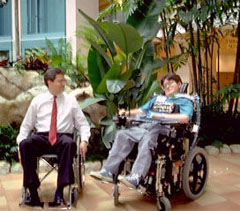Taking a Lead on ADA
by Grace Wagner
Last June, management and employees at the Embassy Suites Hotel at SeaTac Airport near Seattle learned first hand the challenges and rewards of "true" accessibility. The occasion, the Sixth Annual Meeting of the Society for Disability Studies (SDS), brought 125 guests with disabilities to the hotel for almost a week.
Sandy Blondino, director of sales at the Embassy SeaTac, holds what she calls "the thickest file I've ever owned" as she recounts the experience. Blondino credits heavy role playing in the Opening Doors program for the staff's ability to handle the inevitable pressures of a new experience. "We've only scraped the surface in terms of targeting this market, but the toughest part is definitely behind us," she says.
Cheryl Duke co-created Opening Doors®, which Embassy employs chain-wide. The program is based on what she says is the "forgotten section of Title III," requiring businesses to modify behavior, practices and policies to overcome fear and ignorance toward persons with disabilities. "Everyone is so focused on the structural issues of ADA," Duke says, "but more than anything else, attitude is what really determines accessibility."
Teaching management about ADA is not enough, she says: "You can have the Taj Mahal of accessibility and a manager who can recite every nuance of the law, but if your employees are uncomfortable around persons with disabilities, it doesn't matter." Duke knows how infuriating it can be. She founded Woodford, VA-based Opening Doors® along with her husband, Bill, and their son, Paul, who has Duchenne Muscular Dystrophy. Diagnosed at age six, he uses a motorized wheelchair and is dependent on a breathing machine, but nothing stops him from traveling.
"We are a perfect example that ADA can be profitable," Cheryl Duke says. "Persons with disabilities are cautious consumers, but they're also very loyal."


